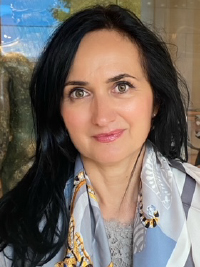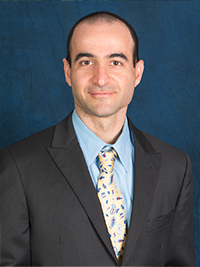2023 Collaborative Seed Grants
 Slavica Tudzarova-Trajkovska, PhD
Slavica Tudzarova-Trajkovska, PhD Associate Professor
Department of Medicine, Endocrinology
University of California, Los Angeles
Los Angeles, CA
 Neema Jamshidi, MD, PhD
Neema Jamshidi, MD, PhDAssociate Professor
Department of Radiological Sciences
University of California, Los Angeles
Los Angeles, CA
Overview
Aim: Biology
Mendelian randomization drew a causal inference between long-standing type-2 diabetes (T2D) as a predisposing risk of developing pancreatic ductal adenocarcinoma (PDAC). Atypical lipid deposit ion is one of the most prominent histologic hallmarks of both PDAC and T2D. Activation of the lipogenic lactate receptor GRP81, found in 94% of PDAC resections, leads to increased intracellular lipid content, DNA repair, and multidrug resistance. Intracellular lipid(s) may mimic obesity through inhibition of the epithelial defense against cancer (EDAC), an anti-tumor defense responsible for elimination of early transformed lesions, called pancreatic intraepitheliel neoplasia (PanINs).
GRP81 is specifically activated by lactate, a signaling molecule which is the end-product of aerobic glycolysis. Locally, lactate can be released from diabetic islets which undergo a Warburg-like transformation of stressed β-cells. We identified the 6-phosphofructo-2-kinase/fructose-2,6- bisphosphatase 3 (PFKFB3) pathway as responsible for islet inflammation and lactate release in T2D. PanINs can be locally exposed to high concentrations of lactate since pancreatic islets co-exist in PanIN complexes.
It is compelling that there is a single nucleotide polymorphism of PFKFB3 that regulates diabetes risk, while also reducing the haplotype frequency of the diabetes-related human leukocyte antigen (HLA). Reduced HLA expression can mediate immune evasion of PanIN lesions in early PDAC development. We propose a model where lactate, secreted from overtly glycolytic islets via PFKFB3 expression, activates GRP81 signaling and increases survival of PanINs. We propose that PFKFB3 polymorphism may select a fraction of T2D patients that will develop PDAC. To test this model, we will: Interrogate the role of PFKFB3 polymorphism and multi-cellular metabolism in PDAC with long-standing T2D using NIH databases and Tissue-specific Metabolic Reconstruction Models (Aim 1); and perform in vitro and in vivo target validation of GPR81 using mouse models of T2D and PDAC comorbidity (Aim 2).